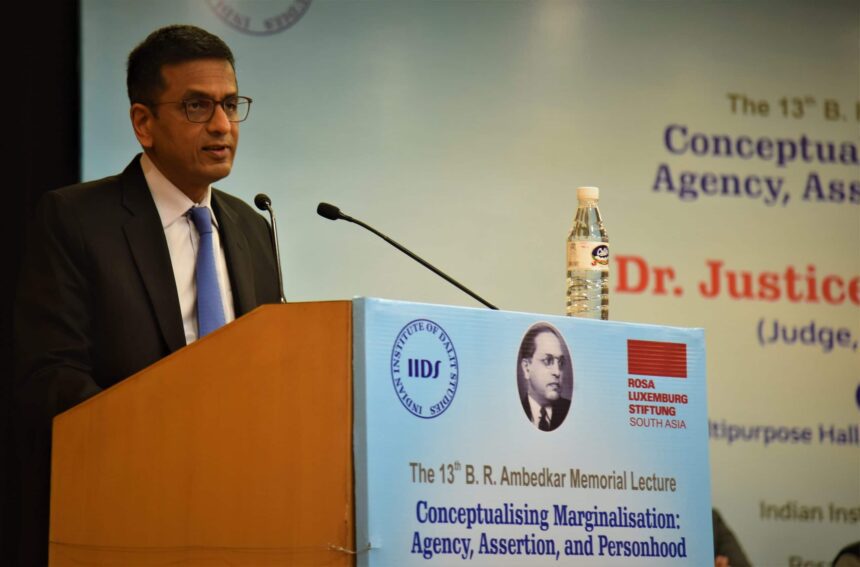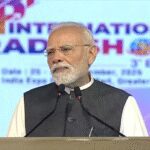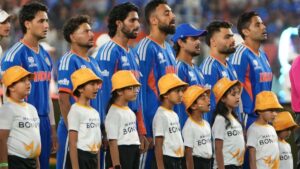Former Chief Justice of India DY Chandrachud has ignited controversy with his remarks during an interview with Sreenivasan Jain for Newslaundry, where he described the “very erection” of the Babri Masjid in 1528 as the “fundamental act of desecration.” This statement aligns with observations made in the Ayodhya verdict, which has garnered extensive scrutiny in Indian judicial history.
Chandrachud stated, “The erection of the Babri Masjid was itself a fundamental act of desecration of a site believed by Hindus to be Lord Ram’s birthplace.” He reiterated that critics of the 2019 Ayodhya judgment often possess a “selective view of history,” claiming many haven’t read the 1,045-page decision. He elaborated that the judgment involved a thorough examination of archaeological reports, historical texts, and revenue records, asserting that the evidence indicated a pre-existing Hindu temple beneath the Babri Masjid.
He affirmed that the unanimous decision to allocate the disputed 2.77 acres to Hindu parties was rooted in issues of title suits rather than religious sentiment. Furthermore, the court directed the allocation of a five-acre plot for a mosque, highlighting its intent to establish a balance.
Critics, including former Supreme Court judge Justice Rohinton Fali Nariman, have alleged that the verdict undermined India’s secular fabric by favoring Hindu claims. Chandrachud countered that “Secularism in India isn’t atheism; it’s equality of all faiths,” emphasizing that judges are required to be impartial, not atheistic.
Responding to Chandrachud’s comments on judges acting as social reformers post-retirement, Justice S Muralidhar interpreted this as a compliment, noting his longstanding commitment to public interest litigation and social causes.
The discussion also ventured into the 2023 Supreme Court order allowing a videographic survey of the Gyanvapi Mosque in Varanasi. This decision has drawn criticism, as it seemingly contravenes the 1991 Places of Worship Act, which aims to preserve the religious character of sites as of August 15, 1947.
Commenting on DY Chandrachud’s media appearances, advocate Ashish Goel expressed concerns about the integrity of the judiciary, suggesting that he has aligned himself with executive interests. Similarly, advocate Prashant Bhushan condemned Chandrachud’s interviews, arguing that they reveal a communal mindset and emphasize select historical narratives to justify controversial rulings.
Suchitra Vijayan remarked that those familiar with Chandrachud’s judgment history would not be surprised by his comments, highlighting a troubling trend she perceives in the intersection of legal progressiveness and political alignment in India.
Journalist Waquar Hasan pointed out that the liberal stance often associated with some justices does not preclude support for Hindu nationalist viewpoints. Additionally, critics have noted discrepancies between Chandrachud’s statements and the Ayodhya judgment, emphasizing the lack of conclusive evidence regarding the earlier structure.
Chandrachud’s reference to “guidance from God” in his decision-making faced backlash, with commentators asserting it undermined the separation between faith and law, potentially indicating external pressures influencing judicial outcomes.
The interview also addressed challenges faced during his tenure, such as same-sex marriage petitions and electoral bond transparency, with Chandrachud acknowledging the polarizing environment in which judges operate. He noted, “Judges are human; we err, but we strive for institutional integrity.” Since assuming office in 2016, Chandrachud has been regarded as a liberal figure, though his tenure has been scrutinized for perceived biases favoring the ruling political party.
His public engagements have sometimes been viewed as aligning with government perspectives, raising concerns among observers about the independence of the judiciary.
Tags: Babri Masjid, DY Chandrachud, desecration, Supreme Court, religious controversy
Hashtags: #Erection #Babri #Masjid #fundamental #act #desecration #CJI #Chandrachud #sparks #outrage










